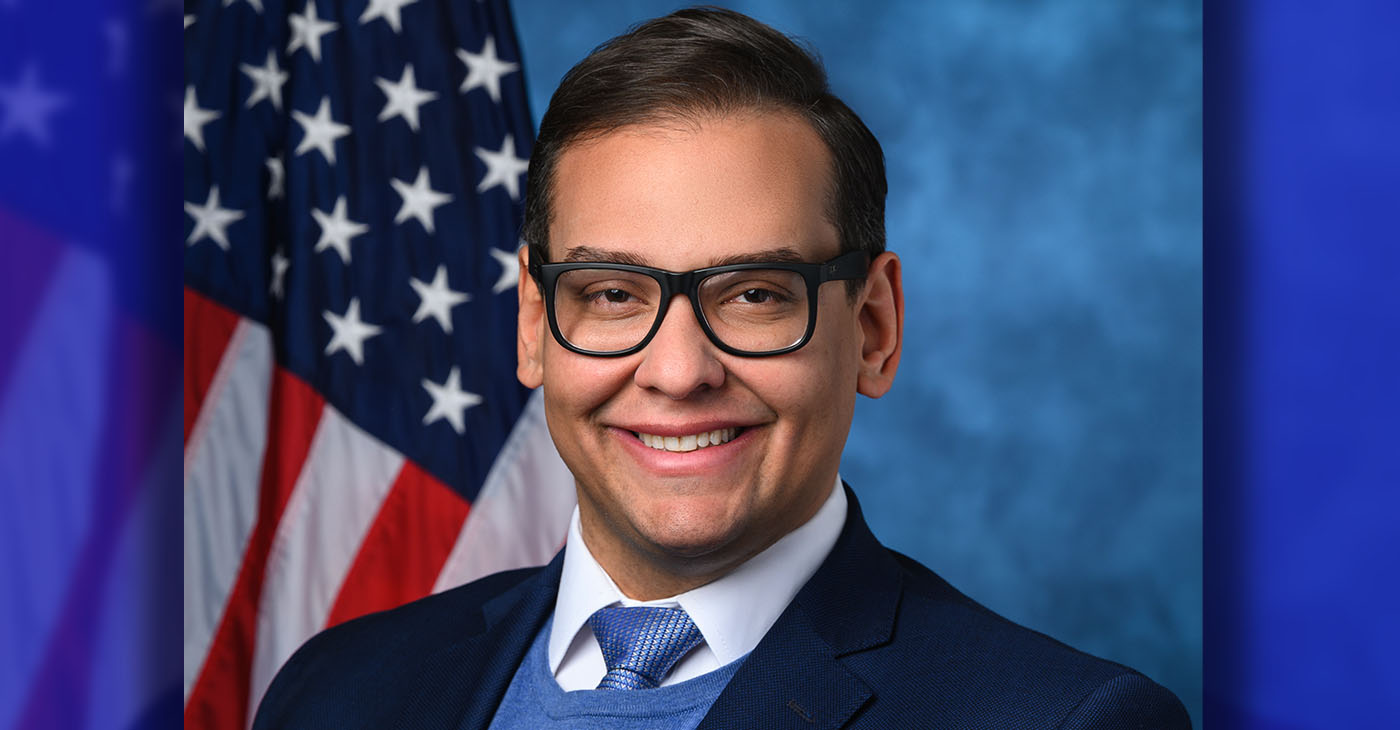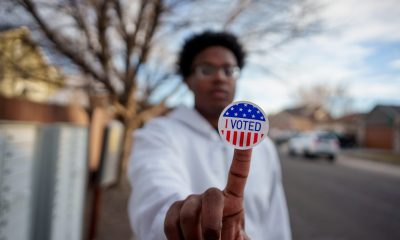Commentary
OPINION: Once Again, Barbara Lee Shows the Way in Vote to Expel Rep. George Santos
“George Santos lied about everything—from 9/11 and the Holocaust to his own name,” Lee tweeted. “He defrauded voters, stole money, and faces criminal charges in two countries. I voted to expel him from Congress today.” Lee, who is running for the Senate seat vacated by the death of Dianne Feinstein, noted how her opponents in the Senate race chose to give Santos a pass. Rep. Katie Porter (D-Calif.) did. And Rep. Adam Schiff (D-Calif.) didn’t even vote. Travel delay, Schiff said later.

By Emil Guillermo
Disgraced former New York Representative George Santos didn’t last a term in office before he made history as the sixth person ever to be expelled from Congress recently.
You want to know how to make history?
Just look at Barbara Lee, a member of Congress since 1998, who, in 2001, was the only member of the House to vote against giving a blank check to attack any country involved in the Sept. 11 attacks.
Voting against Authorization for Use of Military Force Against Terrorists (AUMF) took guts and courage. She was the only one to take that stand.
To this day, whenever I mention Lee’s name to someone outside of her Alameda County district, people never fail to mention how they recall how she was the lone person in Congress to stand for her principles and values on that key vote.
Compare that to Santos, who has 23 federal indictments for lying and fraud related to campaign finance laws. He’s never once refuted the charges despite given opportunities by reporters.
And then there’s the House Ethics Committee investigation that found Santos’ conduct brought such “severe disrepute to the House” that it jeopardized public trust.
But it surely must have made you appreciate being represented by Barbara Lee even more.
That Santos could even be in the same legislative body as Lee insults our democracy.
Lee knew the right action was to vote for Santos’ expulsion the first time they tried on Nov. 2
She joined other Republicans who were ready to throw out Santos then, but the vote failed because most Democrats chose to play politics. Some said it would set a dangerous precedent since Santos hadn’t been convicted yet.
But Lee knew the violations to the institution were serious enough already. She voted Santos out. In doing so, she again cast a vote that set her apart from your average self-serving politico.
“George Santos lied about everything—from 9/11 and the Holocaust to his own name,” Lee tweeted. “He defrauded voters, stole money, and faces criminal charges in two countries. I voted to expel him from Congress today.”
Lee, who is running for the Senate seat vacated by the death of Dianne Feinstein, noted how her opponents in the Senate race chose to give Santos a pass. Rep. Katie Porter (D-Calif.) did. And Rep. Adam Schiff (D-Calif.) didn’t even vote. Travel delay, Schiff said later.
That’s not a good excuse when the people depend on your vote to whittle away at a slim GOP majority in the House.
Then came the vote last week, a month later. On Dec. 1, when the House voted again on Santos’ expulsion, Porter and Schiff joined Lee.
Who’s the leader, and who are the followers? Regarding the integrity of Congress, it would have to be Barbara Lee, Alameda County’s member of the House.
That’s why the nation needs someone like Barbara Lee representing California in the Senate. And yet, who is trailing in campaign donations at this stage in the process? Schiff, the impeachment chair, and Porter have raised millions of dollars. Lee is far behind.
Lee’s a pol with integrity who can use all the help she can get. You can trust her to do the right thing.
She helped put Santos where he belongs: Making cameo videos to his Gawker groupies online while he waits for a call from “Dancing with the Stars.”
Lee, on the other hand, deserves to be where she belongs— as the fourth Black woman in the U.S. Senate.
She should have been the third. But Gov. Gavin Newsom played politics and picked Laphonza Butler to fill the vacancy caused by Feinstein’s passing.
Butler has said she will not run once the term is done, but people can change their minds.
In the meantime, Lee’s ready to do the hard work. She deserves broad support throughout the state for what she’s accomplished in the House.
As of this week, she’s officially on the ballot for Feinstein’s spot next March. Tell your friends throughout the state that Lee doesn’t play politics.
She just does the right thing. And isn’t that what you’d want from a House stalwart seeking to take the next step up to the U.S. Senate?
Emil Guillermo is a journalist and commentator. He does a micro-talk show on YouTube.com/@emilamok1
Activism
Oakland Post: Week of April 24 – 30, 2024
The printed Weekly Edition of the Oakland Post: Week of April 24 – 30, 2024

To enlarge your view of this issue, use the slider, magnifying glass icon or full page icon in the lower right corner of the browser window. ![]()
Activism
Oakland Post: Week of April 17 – 23, 2024
The printed Weekly Edition of the Oakland Post: Week of April 17 – 23, 2024

To enlarge your view of this issue, use the slider, magnifying glass icon or full page icon in the lower right corner of the browser window. ![]()
Commentary
Opinion: Surviving the Earthquake, an Eclipse and “Emil Amok.”
Last Friday, a 4.8 magnitude earthquake shook New York City, reported as the “biggest earthquake with an epicenter in the NYC area since 1884” when a 5.2 quake hit. A bit bigger. The last quake similar to Friday’s was a 4.9 in 1783.Alexander Hamilton felt it — 241 years ago. That’s why New Yorkers were freaking out on Friday. They were in the room where it happens.

By Emil Guillermo
I’m a Northern Californian in New York City for the next few weeks, doing my one-man show, “Emil Amok, Lost NPR Host, Wiley Filipino, Vegan Transdad.”
I must like performing in the wake of Mother Nature.
Last Friday, a 4.8 magnitude earthquake shook New York City, reported as the “biggest earthquake with an epicenter in the NYC area since 1884” when a 5.2 quake hit. A bit bigger. The last quake similar to Friday’s was a 4.9 in 1783.
Alexander Hamilton felt it — 241 years ago.
That’s why New Yorkers were freaking out on Friday. They were in the room where it happens.
And it just doesn’t happen that often.
Beyonce singing country music happens more frequently.
When I felt New York shake last week, it reminded me of a time in a San Francisco TV newsroom when editors fretted about a lack of news an hour before showtime.
Then the office carpeting moved for a good ten seconds, and the news gods gave us our lead story.
On Friday when it happened in NYC, I noticed the lines in the carpeting in my room wiggling. But I thought it was from a raucous hotel worker vacuuming nearby.
I didn’t even think earthquake. In New York?
I just went about my business as if nothing had happened. After living near fault lines all my life, I was taking things for granted.
Considering the age of structures in New York, I should have been even more concerned about falling objects inside (shelves, stuff on walls) and outside buildings (signs, scaffolding), fire hazards from possible gas leaks, and then I should have looked for others on my floor and in the hotel lobby to confirm or aid or tell stories.
Of course, as a Californian who has lived through and covered quakes in the 4 to 6 magnitude range, I tried to calm down any traumatized New Yorker I encountered by taking full responsibility for bringing in the quake from the Bay Area.
I reassured them things would be all right, and then let them know that 4.8s are nothing.
And then I invited them to my consoling post-Earthquake performance of “Emil Amok, Lost NPR Host…”
It was the night of the eclipse.
ECLIPSING THE ECLIPSE
In New York City, the eclipse was about 90 percent visible. Good enough for me. Though a full solar eclipse is a celestial rarity, blockages of any sort aren’t generally celebrated. My one-man play is about growing up with the eclipsed history of American Filipinos and how I struggle to unblock all that.
For example, did you know the first Filipinos actually arrived to what is now California in 1587? That’s 33 years before the Pilgrims arrived in America on the other coast, but few know the Filipino history which has been totally eclipsed.
I was in Battery Park sitting on a bench and there was a sense of community as people all came to look up. A young woman sitting next to me had a filter for a cell phone camera. We began talking and she let me use it. That filter enabled me to take a picture of the main event with my iPhone.
For helping me see, I invited her and her boyfriend to come see my show.
Coincidentally, she was from Plymouth, Massachusetts, near the rock that says the year the Pilgrims landed in 1620.
In my show she learned the truth. The Pilgrims were second.
History unblocked. But it took a solar eclipse.
Next one in 2044? We have a lot more unblocking to do.
If you’re in New York come see my show, Sat. April 13th, 5:20 pm Eastern; Fri. April 19, 8:10 pm Eastern; and Sun. April 21st 5:20 pm Eastern.
You can also livestream the show. Get tickets at www.amok.com/tickets
About the Author
Emil Guillermo is a journalist and commentator. He does a mini-talk show on YouTube.com/@emilamok1. He wishes all his readers a Happy Easter!
-

 Activism4 weeks ago
Activism4 weeks agoOakland Post: Week of March 27 – April 2, 2024
-

 #NNPA BlackPress4 weeks ago
#NNPA BlackPress4 weeks agoBeloved Actor and Activist Louis Cameron Gossett Jr. Dies at 87
-

 Community1 week ago
Community1 week agoFinancial Assistance Bill for Descendants of Enslaved Persons to Help Them Purchase, Own, or Maintain a Home
-

 Activism3 weeks ago
Activism3 weeks agoOakland Post: Week of April 3 – 6, 2024
-

 Business2 weeks ago
Business2 weeks agoV.P. Kamala Harris: Americans With Criminal Records Will Soon Be Eligible for SBA Loans
-

 Activism2 weeks ago
Activism2 weeks agoOakland Post: Week of April 10 – 16, 2024
-

 Community2 weeks ago
Community2 weeks agoAG Bonta Says Oakland School Leaders Should Comply with State Laws to Avoid ‘Disparate Harm’ When Closing or Merging Schools
-

 Community7 days ago
Community7 days agoOakland WNBA Player to be Inducted Into Hall of Fame


























































